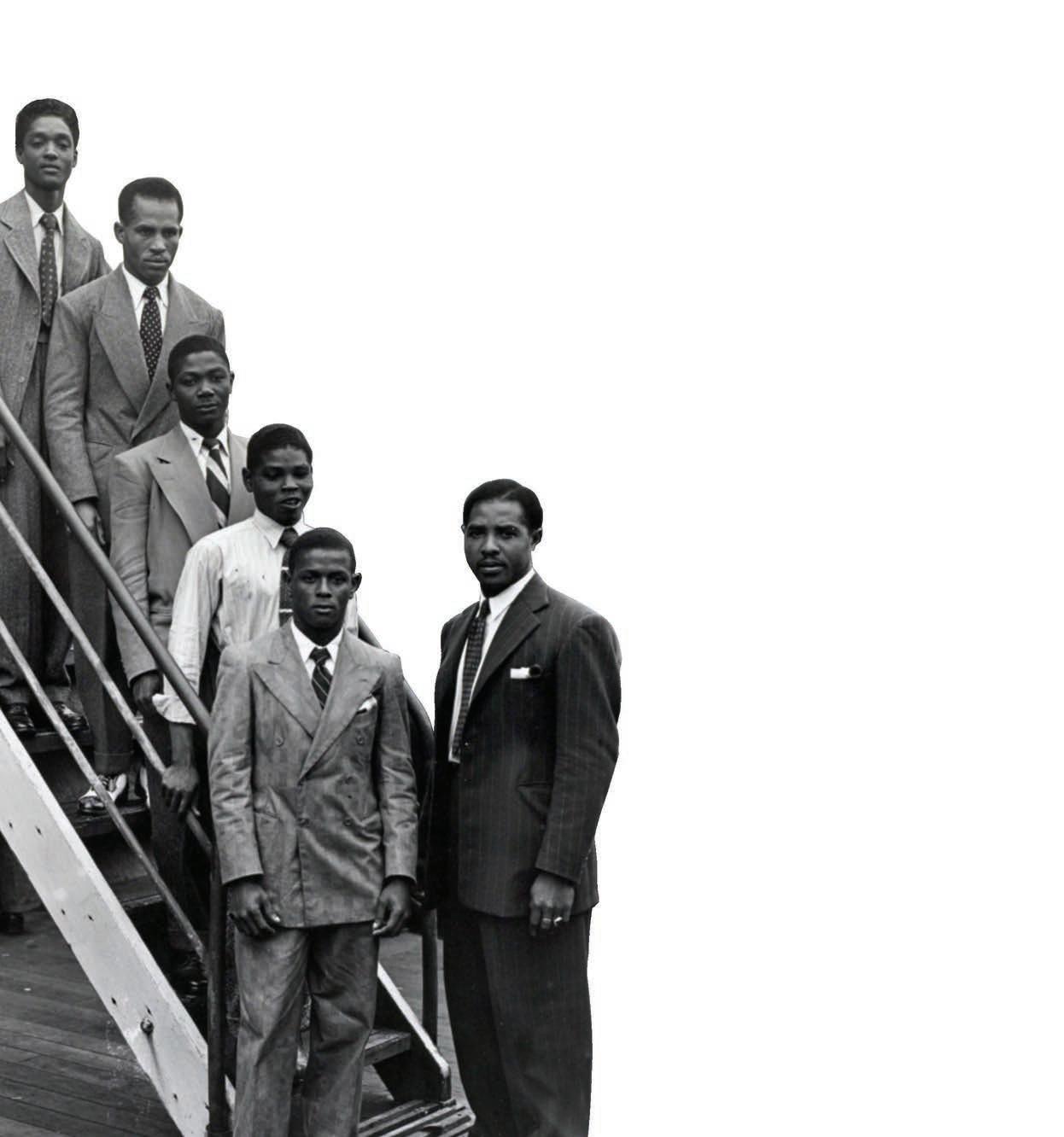
5 minute read
Nationality, Identity and Belonging
By Dr Juanita Cox
In April 2018, during the Commonwealth Summit in London, a major controversy broke over the treatment of members and descendants of the ‘Windrush Generation’ who had migrated to the UK from the Caribbean in the two decades after the end of the Second World War. This year, I had the opportunity to lead a research project with the Institute of Commonwealth Studies (ICwS) at the University’s School of Advanced Study (SAS), to capture the oral histories of these people and to examine their relationship to the British state. The purpose of the research was to explore key questions and highlight the importance of the Windrush Generation in higher education.
As the UK’s national centre for the promotion of research in the humanities, the School of Advanced Study is at the forefront of developing and supporting innovative research initiatives. Diversity and inclusion are at the heart of research projects and programmes, bridging the gap between academia and social policies in order to take control of inequality and injustice across society. It is for this reason the ICwS and SAS chose to focus on the historic and contemporary issues of those individuals and communities affected by the Windrush scandal.
A ‘hostile environment’
Under the 1948 British Nationality Act, members of the Windrush Generation shared the status of ‘Citizens of the UK and Colonies’ (CUKCs). However, the 1962 Commonwealth Immigrants Act removed the right of free entry into the UK of CUKCs. Subsequent acts in 1965, 1968, 1971 and 1981 further restricted the right of CUKCs and ‘Commonwealth citizens’ to enter and settle in Britain. Although Commonwealth citizens who had been settled in the UK for five years prior to 1 January 1973 (the date when the 1971 Act came into force) were entitled to right of abode, official records were not systematically kept of those who enjoyed such status.
From 2010 onwards, Whitehall enforced a ‘hostile environment’ towards those suspected of being illegal immigrants. New legislation was introduced in the form of the 2014 and 2016 Immigration Acts, which made it more difficult for those who could not prove their legal right to be in the UK to remain in the country and to obtain work and accommodation. Over the course of the decade, significant numbers of Caribbean immigrants and their children, who lacked documentary evidence of their right to remain in the UK, found themselves threatened with, or subjected to, detention and deportation.
Some of the most vulnerable members of British society found themselves trapped without recourse to legal aid. Uniquely positioned between academia, Westminster and society, ICwS set out to record and track the actual lived experiences of people and communities affected. The Institute investigated the extent of the British state’s efforts to inform Caribbean communities in London of the implications of immigration legislation, as well as to explore the circumstances that left members of the Windrush diaspora without legal proof of their right to remain in the UK.
Holding those in power to account for what happened was what the study hoped to achieve, highlighting a traditionally under-represented group within the higher education sector, while also enhancing the University’s engagement with this important community group.
Capturing oral histories during the pandemic
This initial scoping project reviewed sources of primary and secondary material, and researched and recorded the location of oral history archives, all whilst connecting with interviewees willing to discuss their experiences and perceptions of the scandal. One of the aims of the oral history project was to ensure that the diversity of the Windrush Generation was represented as fully as possible. The focus of scholars on the experiences of Jamaican-heritage communities has tended to obscure the varied experiences of other Anglophone-Caribbean migrants, in particular those of Indian or Chinese background.
A major and significant one day witness seminar was planned for early June, aiming to highlight the importance of the Windrush Generation and to delve deeper into the experiences of those involved, to better understand why political events, changes, and legislations went unquestioned for so long.
The seminar was due to be held at the Black Cultural Archives located in Brixton, South London, but as with so many events this year, it had to be cancelled due to the pandemic. In response, the researchers turned to technology. Several of the interviewees were unfamiliar with using MS Teams video-conferencing technology, or did not even have access to computers, laptops and smartphones. Due to the UK lockdown rules, they were additionally unable to elicit help from family members or friends. While lockdown presented several challenges, it also provided an opportunity to explore the value of conducting online interviews. Five semistructured individual history interviews involved respondents from Grenada, Guyana, Trinidad and St Lucia with varied ethnic backgrounds: Indian, Chinese, African, and mixed heritage.
Given the impossibility of a physical seminar, I conducted five additional interviews that focused on individuals whose right to British citizenship had been denied and had variously led to loss of employment, housing, healthcare or pension entitlements, while also making them vulnerable to detention or deportation. Online technology enabled witness interviews to be conducted from far-afield, supporting our aim of further representation of the Windrush Generation. Two interviewees were based in London, three were resident in Manchester, Burnley and Trinidad. Two had been born in Jamaica, the others in Antigua, St Lucia, and Dominica. Remote interviewing offered the witnesses greater control over when to terminate their interview. It also offered those reluctant to share emotions in public greater dignity due to the anonymity offered by turning off their camera.
Findings and next steps
The findings of this pilot project, alongside readings of Amelia Gentlemen’s The Windrush Betrayal (2019) and Wendy Williams’ Windrush Lessons Learned Review (2020), enabled us to identify gaps in the scholarship and to prepare for further research. Many of the transcripts and recordings of interviewees can be found on our dedicated web pages. A longer term Arts and Humanities Research Council (AHRC)-funded project will, if given the go-ahead, offer a scholarly examination of the so-called ‘Windrush scandal’ within a fully trans-national framework, one that considers the agency of a wide variety of official and nonofficial actors from both sides of the Atlantic and the role of the post-colonial and Commonwealth contexts of international relations. Its key objective is to develop a unique digital research resource of extended interviews on the national
and diplomatic activism around the Windrush scandal, supported by digitised government documents from the British archives and Caribbean government records. Ultimately, this vital research aims to give voice to traditionally under-represented people, to ensure we can learn from the past.
Dr Juanita Cox is a visiting research fellow at the School of Advanced Study. You can read more about the project at: commonwealth.sas.ac.uk/researchprojects/oral-history-windrush-generation
Photo by Popperfoto via Getty Images/Getty Images: 22nd June 1948, Immigrants from the Caribbean island of Jamaica arrive at Tilbury, London, on board the ‘Empire Windrush’, this party are five young boxers and their manager.










